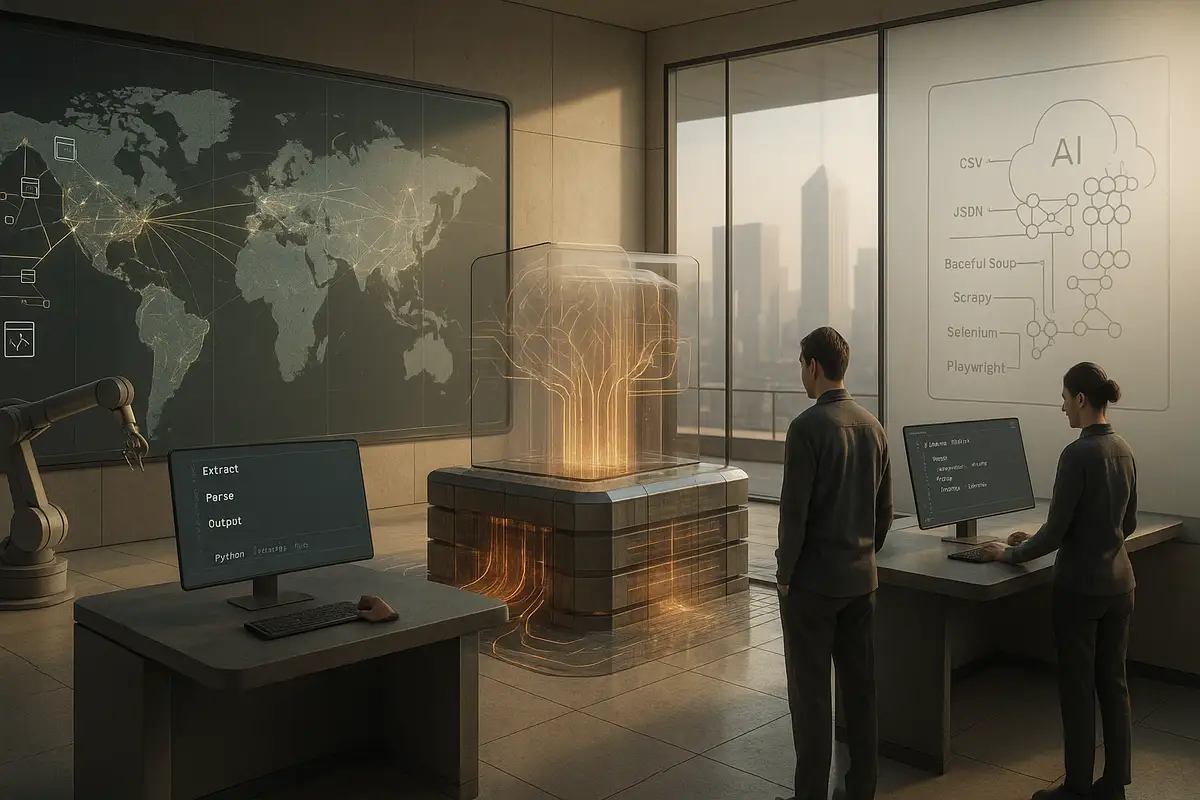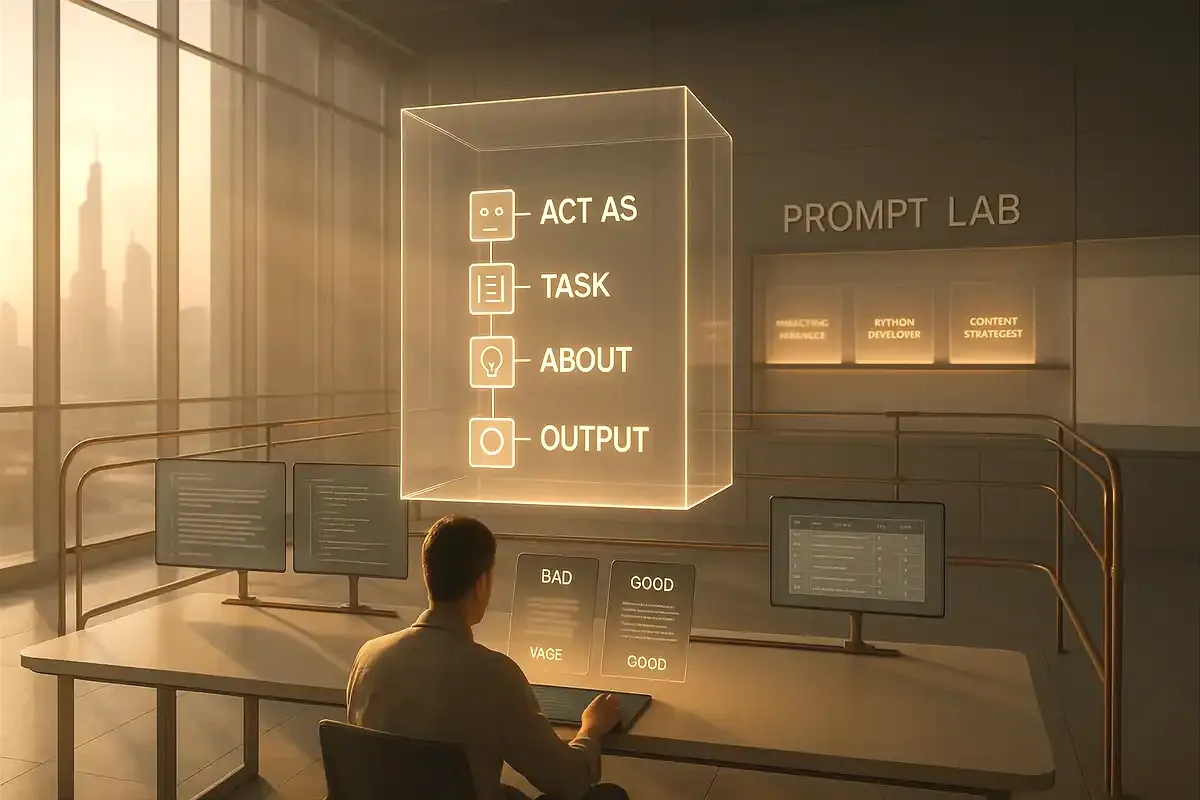AI Conversations Aren’t Permanent: Vanishing AI Chats Leave Users Scrambling for Backups—and Solutions Exist
You spent three hours crafting the perfect prompt. ChatGPT finally cracked that complex coding problem that stumped you for weeks. Claude helped you write a presentation that landed the big client. Gemini walked you through a data analysis that saved your project.
Then you realize: where did those conversations go?
Your AI chats live in the cloud, tied to your account. Close the app, lose internet access, or face a service outage, and accessing that valuable exchange becomes impossible. Companies can change data retention policies without warning. Accounts get suspended. Services shut down.
The solution isn't hoping the cloud keeps your data forever. It's taking control and building your own archive.
Both OpenAI and Anthropic offer export tools, plus smart browser extensions make the process automatic. Google's Gemini requires more creativity, but it's doable. Here's how to build a bulletproof archive of your AI conversations that you'll actually own forever.
Why Your AI Conversations Matter More Than You Think
Many people think AI conversations don't matter once they're done. They're wrong. These exchanges contain intellectual property you created through careful prompting. They hold solutions you didn't have before, creative ideas worth revisiting, and debugging strategies that took hours to perfect.
Companies are already discovering this value. Legal teams want records of AI assistance for compliance. Research departments need reproducible conversation logs. Software teams archive coding sessions for knowledge transfer when developers leave.
Your personal AI conversations deserve the same treatment. That breakthrough debugging session with ChatGPT? The marketing copy Claude helped you perfect? The data analysis workflow Gemini taught you? All gone unless you save them.
The current "hope the cloud keeps it forever" approach fails serious users. You need a real backup strategy.
The Official Export Routes: Getting Everything at Once
ChatGPT's Built-in Backup System
OpenAI makes grabbing your chat history relatively painless. Both free and paid users can export their complete conversation history.
Open ChatGPT (web or desktop) and click your profile icon. Navigate to Settings → Data Controls → Export Data. Confirm your request, and OpenAI will email you a download link within minutes. The link expires after 24 hours for security.
Download the ZIP file. You get two things: an HTML file you can browse easily, and a JSON file with all your prompts and responses. The JSON file matters most—it has every conversation with timestamps and complete text.
This covers all your chats in one download. Perfect for a complete baseline backup.
Important limitation: The export doesn't include images you uploaded or DALL-E creations from conversations. Save those separately if they matter.
Claude's Download Options
Anthropic offers two ways to get your data. Both work for free and paid users.
Method 1: Click your initials in Claude's lower-left corner, go to Settings → Privacy → Export Data. Claude compiles your data and emails a download link when ready. Claude sends a .dms file. Rename it to .zip and open it normally.
Method 2: On Claude's web interface, look for the "Download All Chats" button on the main chats page. This downloads the .dms file immediately without waiting for email. Much faster for regular backups.
Inside the extracted archive, find conversations.json with your complete chat history. Early versions had bugs where Claude responses were missing, but that's been fixed. The export now includes both sides of every conversation.
Note: The quick-download button only works on the web version, not the desktop app.
Gemini's Workarounds
Google hasn't added a one-click export for Gemini conversations yet. But you have several options:
Response-by-Response Exports: Below each Gemini response, use the "Share & export" menu. Send answers to Google Docs, Gmail, or Sheets. Export tables directly to Sheets, or send code to Colab. This works well for capturing specific answers but splits long conversations across multiple documents.
Public Link Sharing: Generate a shareable link for entire conversations. Click Share → Share conversation to create a g.co/gemini/share/ URL. Anyone with the link can view the full transcript. Create the link, open it to verify it loaded completely, then save the page as HTML or copy the text. Delete the shared link afterward if privacy matters.
Manual Save Methods: Scroll through the complete conversation, then use your browser's "Save page as..." to create an offline HTML archive. Or copy all text and paste into a document. Some users ask Gemini to "repeat our entire conversation" for easy copying, though long chats might hit length limits.
Enterprise Account Limitation: Google Workspace accounts often disable sharing and export features for compliance reasons. You might be limited to manual copying.
Google doesn't include Gemini chats in Google Takeout yet. These workarounds are your best options until they add official export.
Browser Extensions: The Smart Way to Archive
Manual exports work for occasional backups. For regular archiving, browser extensions eliminate the hassle.
ChatGPT Extensions
Save ChatGPT to Obsidian transforms conversations into markdown files instantly. Install it, open any ChatGPT conversation, and click export. The extension preserves formatting, code blocks, tables, and conversation structure perfectly.
The real power is batch export. Click "Export All" and download every conversation as organized markdown files. The extension handles hundreds of chats automatically, naming files by conversation titles or dates. Set it to save directly in your Obsidian folder.
Save ChatGPT to Notion does the same thing, but puts conversations straight into Notion. One click creates a structured Notion page in your chosen database. It supports batch syncing and avoids duplicates by checking existing records. Perfect if you live in Notion and want AI chats searchable alongside your other notes.
Both extensions offer customization: file naming patterns, save locations, and organizational subfolders. They're essentially automating the copy-paste process with perfect formatting preservation.
Claude Extensions
Claude Exporter (also called Claude Export Tool) provides one-click downloads for Claude conversations. Pick your format: Markdown, text, JSON, HTML, PDF, or CSV. Export the complete chat or select specific parts.
The extension captures everything Claude shows—messages, formatting, tables, code blocks, and even Claude's "thinking" steps when visible. It handles most content excellently, though extremely long conversations or large file attachments might need manual review.
The result is a clean markdown file ready for Obsidian, a PDF for sharing with colleagues, or JSON for custom processing. Much faster than the official export for individual conversations.
Gemini Extensions
Gemini Exporter fills Google's export gap. Install it, open a Gemini chat, and click the export button. Choose from PDF, Markdown, TXT, CSV, or JSON formats.
You can customize what gets exported: which messages, how timestamps look, PDF page size, and color themes. It captures all conversation content including code blocks with syntax highlighting, math formulas, tables, charts, and Google's "Thinking Process" displays.
The tool processes everything locally—no data goes to third-party servers. For heavy PDF generation, the developer charges a small fee to cover processing costs, but basic exports are free.
Multi-Platform Extensions
AI Chat Exporter and ExportGPT support multiple platforms (ChatGPT, Claude, Gemini) and can save to PDF or images. Useful if you want one tool for everything, though specialized extensions often have better format support for each platform.
Security Note: Use extensions from reputable developers. Check that processing happens locally and no data gets sent to external servers. The extensions mentioned here explicitly state they don't collect your conversation data.
Converting to Markdown: Your Universal Future-Proof Format
Markdown keeps appearing in these solutions for good reason. Markdown handles headings, bold text, lists, code, tables, and links—everything you see in AI responses.
You can read markdown files in any text editor. Obsidian, Notion, Ghost, GitHub, and most writing apps understand markdown. By converting AI conversations to markdown, you ensure they remain accessible decades from now without proprietary software.
Converting Official Exports
ChatGPT and Claude exports come as JSON—not human-readable. Community tools convert these to markdown automatically.
chatgpt-to-markdown by Sriram Srinivasan (available on npm) takes ChatGPT's conversations.json and outputs markdown files—one per chat. After exporting and unzipping your ChatGPT data, run:
npx chatgpt-to-markdown path/to/conversations.json
It generates clean markdown transcripts with proper headings for each user prompt and code fenced in triple backticks.
Python scripts and Jupyter notebooks do similar JSON-to-markdown conversion. You can find several options on GitHub that handle the conversion process. The goal is liberating your data from JSON into a readable, searchable format.
For Claude's JSON, developer Simon Willison created an Observable notebook that converts conversation data to formatted markdown. You grab the JSON from Claude's network inspector and paste it into the web tool for instant markdown output.
Pro tip: Browser extensions that output markdown directly skip this conversion step entirely. They're doing the transformation automatically as they save.
Why Markdown Wins
Markdown is enduring. A .md file from today will open in any text editor decades from now, unlike proprietary chat formats. The files are tiny—even heavy users with 500+ conversations rarely exceed 50MB total.
Markdown files are searchable with standard tools. You can version-control them with Git, run analytics to find patterns, or import them into any modern writing platform. They serve as a universal interchange format.
Want to publish a conversation on your blog? Import the markdown. Need to create a PDF report? Convert from markdown. Building a knowledge base? Markdown works everywhere.
Most export extensions either output markdown directly or offer it as an option. If you prefer PDF or HTML for sharing, those work too, but markdown gives you flexibility to convert to anything else later.
Building Your Archive Workflow: From Chaos to System
Having tools is half the battle. Using them consistently is the other half. Here's how to build a workflow that actually works.
The Initial Data Dump
Start with a complete export of existing conversations. This creates your baseline archive—everything from day one.
For ChatGPT: Use the official Export Data process for a complete ZIP of all past chats. If you prefer faster processing, use the Save ChatGPT to Obsidian extension's Batch Export to pull every conversation as markdown files. Much quicker than opening each chat manually.
For Claude: Use the official export or "Download All Chats" button for the complete .dms file. For faster individual file creation, open your chat list, Ctrl+click to open multiple chats in new tabs, then use Claude Exporter on each tab. Takes only a few clicks per chat.
For Gemini: Currently requires manual work. Use the public link method for important conversations, or save pages as HTML. If you have many valuable Gemini chats, budget time for this initial extraction.
The result should be an archive folder containing all your AI conversations to date. Organize by service (ChatGPT folder, Claude folder, Gemini folder) and possibly by year or project.
Now you have everything. If services change or accounts disappear, you still have your conversations.
Ongoing Maintenance Strategy
Develop a rhythm for regular exports. The frequency depends on your usage:
Daily exports: If you're doing intensive research, coding, or creative work with AI. Use extensions to save important conversations immediately after finishing them.
Weekly exports: Works for most users. Set a weekly reminder to back up your chats. Takes just minutes with the right tools.
Monthly comprehensive exports: Use official exports to catch any conversations you forgot to save manually. This serves as your safety net.
Immediate saves: For breakthrough conversations, export right away while they're fresh. That debugging session that finally worked? That creative brainstorm that sparked a new project? Save it before you forget.
Some technical users automate this entirely. Community members have shared Tampermonkey scripts that automatically scrape Claude conversations into text files. Others write scripts using unofficial APIs to fetch and save chats nightly. You can find examples on GitHub. But manual exports with extensions cover most needs without complexity.
Stay consistent. Your archive only protects conversations you remember to export.
Organization That Actually Works
A pile of files isn't useful unless you can find what you need. Structure your archive for easy retrieval:
By Date: Prefix filenames with conversation dates (2025-07-25 - ChatGPT - Python Bug Fix.md). Enables chronological sorting. Most extensions can add dates automatically.
By Topic: Use conversation titles or subjects in filenames ("Build SQL Query.md" or "Claude - Marketing Ideas.md"). Great for finding specific subjects later.
By Source: Tag or denote which AI you used (#chatgpt, #claude, #gemini). Helpful since each AI has different strengths and conversation styles.
Folder Structure Options:
- Chronological: Chats/2025/07/ or Chats/2025-Q3/
- By Platform: Chats/ChatGPT/, Chats/Claude/, Chats/Gemini/
- By Project: Chats/Website-Redesign/, Chats/Data-Analysis/
- Hybrid: Chats/ChatGPT/2025/ for maximum organization
Database vs. Folders: In Obsidian or file systems, use folders. In Notion, create one database with properties for AI model, date, project, and topic. Filter and search as needed.
Linking and Cross-Referencing: Link AI conversations to your other notes. If ChatGPT helped with a project, link that conversation to your project notes. When you revisit the project, you'll see the AI assistance context immediately.
Searchability is Everything: Ensure your archive location is searchable. Obsidian has excellent full-text search across all notes. Notion is searchable by default. Local files work with desktop search tools. The whole point is finding information later, so make it easy on your future self.
Consider adding brief summaries at the top of saved chats. Some extensions do this automatically, or you can add your own tags for important insights.
Professional and Enterprise Use: Beyond Personal Archives
AI conversation archiving isn't just personal productivity—it's becoming business critical.
Compliance and Documentation
Enterprises often restrict AI tools because conversations can't be properly archived for audits. Legal teams need records of AI assistance. Medical professionals require logs for compliance. Financial advisors must document AI-supported recommendations.
Regular conversation backups help meet these requirements. Instead of banning AI tools, organizations can require users to archive conversations in approved knowledge systems.
Research and Academic Use
Researchers using AI for brainstorming, reference checking, or analysis need those transcripts as part of their research materials. The conversations provide context for why certain approaches were taken and make work more reproducible.
Academic discussions about citing AI contributions are emerging. Having complete conversation histories means you can reference exactly what the AI contributed to your work.
Knowledge Transfer and Training
Software teams lose valuable debugging knowledge when developers leave. Archived AI coding sessions become institutional knowledge. Sales teams can share successful AI-assisted proposal strategies. Marketing teams can reference AI brainstorming sessions that led to winning campaigns.
Your archived conversations become a knowledge base for the entire organization.
Custom Model Training
Some organizations export chat histories to fine-tune internal AI models or develop prompting guidelines. While OpenAI and Anthropic don't offer APIs for bulk chat retrieval, your saved transcripts could be cleaned and used as training datasets for internal analysis.
You might analyze successful prompts to develop better prompting strategies, or identify patterns in AI responses that work best for your specific use cases.
Publishing and Content Creation
Insightful AI conversations make excellent blog content, case studies, or educational materials. By archiving conversations, you can sanitize private details and publish valuable Q&As.
Ghost, WordPress, and other CMS platforms import markdown directly. An interesting conversation with Claude about market analysis could become a thought leadership article. A debugging session with ChatGPT could help other developers facing similar issues.
Security: Protecting Your Digital Conversations
Exported chats contain everything—code, personal information, company data, strategic discussions. Once you move that data to your storage, you're responsible for keeping it secure.
Storage Security
Local Storage: Ensure disk encryption is enabled (most modern operating systems have this on by default). A stolen laptop shouldn't expose your AI conversations.
Cloud Storage: Use strong passwords and 2FA. Keep archives in private folders. Google Drive, Dropbox, and iCloud encrypt files, but check your sharing settings.
Access Control: Treat chat logs like sensitive documents. Don't accidentally share folders containing AI conversations. When exporting to tools like Notion, verify workspace sharing settings.
Backup Encryption
For long-term archival, consider encrypting backup files. If you zip your archives for storage, add a password. Use encryption tools like 7-Zip or AxCrypt so even if backup files leak, contents remain protected.
Some users prefer local-only archives specifically to avoid cloud security concerns. External hard drives or NAS devices work well for this approach.
Company Policy Compliance
If archiving for work, ensure this practice is approved. Some organizations prefer you not save AI outputs locally if they contain confidential information. Others require it for compliance. Follow the stricter policy to stay safe.
Be especially careful with client data, financial information, or strategic plans discussed in AI chats. These conversations might need special handling or encryption.
Privacy Considerations
Once you have personal archives, you might choose to delete conversations from the original services for privacy. Both OpenAI and Anthropic let you delete chat history, and OpenAI offers an option to disable history saving entirely.
If you delete from the source after archiving, your personal archive becomes the only record. Guard it accordingly.
The ChatGPT Security Lesson
OpenAI's ChatGPT Mac app originally cached conversations locally in plain text—a security risk. They quickly patched it to encrypt local cache files. This highlights that even the apps themselves store data on your device temporarily.
Now that cache is encrypted and not user-accessible, so you can't rely on it for archiving. Proper exports and manual saves remain the reliable methods.
The lesson: Don't assume the services are handling your data securely. Take control with your own archive.
Advanced Workflows: Power User Strategies
Automated Scripting
Technical users can automate exports using browser automation tools like Selenium or Playwright. A script could log in nightly, navigate to export pages, and download new conversations automatically.
Community members have shared various approaches:
- Tampermonkey scripts that scrape conversation lists
- Python scripts using unofficial APIs with account cookies
- AppleScript macros that automate the export button clicking process
For most users, manual exports with extensions provide enough automation without programming complexity.
Integration with Note-Taking Systems
Obsidian Integration: Extensions can save directly to your vault. Use tags, links, and folders to connect AI conversations with other notes. Create a template for AI chats that includes metadata like date, AI model, and topic tags.
Notion Integration: Build databases with properties for categorization. Link AI conversations to project pages, meeting notes, or research databases. Use Notion's API for custom integrations.
Roam Research: Import markdown files or copy content directly. Use block references to link AI insights to other notes.
Analytics and Pattern Recognition
With a large archive, you can analyze patterns:
- Which prompts get the best responses
- What topics you discuss most with each AI
- How your prompting style has evolved
- Success rates for different conversation types
Simple text analysis tools can extract insights from your conversation history. Some users track which AI models work best for different tasks based on their archived conversations.
Content Repurposing
Your archive becomes source material for:
- Blog posts and articles
- Training materials and tutorials
- Case studies and examples
- Presentation content
- Internal knowledge bases
Markdown works everywhere. Copy sections to new documents, combine ideas from different chats, or pull out code examples.
Troubleshooting Common Issues
Export Problems
Empty Files: Early Claude exports sometimes produced empty files due to bugs. Try the "Download All Chats" button instead of the email export, or use browser extensions as backup.
Missing Responses: If official exports only show your prompts but not AI responses, the export may be incomplete. Browser extensions that scrape from the UI can fill gaps.
File Format Issues: Claude's .dms files are just renamed ZIP archives. If extraction fails, try renaming to .zip and using different extraction software like 7-Zip.
Extension Issues
Not Working After Updates: AI services frequently update their interfaces. Extension developers usually fix compatibility within days. Check for extension updates or temporarily use official exports.
Formatting Problems: Complex conversations with tables, images, or special formatting might not export perfectly. Review important conversations manually and adjust as needed.
Large Conversation Limits: Very long conversations might hit browser memory limits during export. Break them into smaller chunks or use official exports for huge conversation histories.
Organization Challenges
File Naming Conflicts: Multiple conversations with similar titles can create naming conflicts. Use date prefixes or unique identifiers to avoid overwrites.
Duplicate Content: Batch exports might create duplicates if run multiple times. Develop a naming convention that includes dates or unique IDs to identify duplicates.
Storage Growth: Regular exports can accumulate significant files over time. Archive older conversations to separate storage if needed, but markdown files are typically small enough that this isn't urgent.
Why This Matters: The Real Value of AI Conversation Archives
Intellectual Property Protection
Your AI conversations represent intellectual property you created through skillful prompting. The questions you asked, the context you provided, and the dialogue you guided all have value. Relying solely on cloud services to preserve this value is risky.
Companies change policies. Services shut down. Accounts get suspended. Your archive protects against all these scenarios.
Learning and Improvement
An archive transforms one-off AI interactions into a growing knowledge base. Over time, you accumulate solutions to common problems, successful prompting strategies, and creative approaches that worked well.
Reviewing past conversations helps you improve your prompting skills. You can see which approaches got better responses and refine your technique accordingly.
Reference and Reuse
Six months later, you'll want to reference that perfect explanation ChatGPT gave about APIs, or the marketing copy Claude helped you craft, or the data analysis approach Gemini taught you.
No archive means starting over every time. With one, you build on what worked before.
Team and Organizational Benefits
Archived conversations become institutional knowledge. New team members can learn from successful AI interactions. Best practices spread naturally when people can reference and share effective conversations.
Organizations that embrace AI archiving gain competitive advantages through better knowledge retention and transfer.
Future Applications
Your conversation archive could power future applications:
- Training custom AI models tuned to your communication style
- Building personal AI assistants that understand your preferences
- Creating searchable knowledge bases for specific domains
- Developing prompting guidelines based on what worked well
The more complete your archive, the more valuable these future applications become.
Peace of Mind
Perhaps most importantly, archiving provides peace of mind. No more panic when you can't find that crucial conversation. No more starting over because you lost access to previous work.
You know that breakthrough debugging session, that creative brainstorm, that research deep-dive—it's all safely preserved in your own system.
Getting Started: Your First Steps
- Choose your tools: Start with official exports for baseline archives. Add browser extensions for ongoing saves. Pick one platform to begin with if you use multiple AI services.
- Do the initial dump: Export everything you have so far. This might take time if you have extensive history, but it establishes your foundation.
- Set up organization: Create folder structures or database systems that make sense for your workflow. Simple is better than perfect.
- Establish routine: Set reminders for regular exports. Weekly works for most people. Daily if you're doing intensive AI work.
- Test your system: Make sure you can find and open archived conversations. Verify formats work in your chosen tools. Adjust organization as needed.
- Expand gradually: Once comfortable with one AI service, add others. Refine your workflow based on actual usage patterns.
The effort you invest in setting up a good archival system pays dividends immediately. Every conversation you save today becomes a resource you can reference tomorrow.
Your AI conversations are too valuable to lose. Start archiving them now, before you need them and they're gone.
Essential Links for AI Conversation Archiving
Browser Extensions:
- Save ChatGPT to Obsidian - Chrome Web Store
- Save ChatGPT to Notion - Chrome Web Store
- Claude Exporter - Chrome Web Store
- Gemini Exporter - Chrome Web Store
- AI Chat Exporter - Chrome Web Store
Conversion Tools:
- chatgpt-to-markdown - NPM Package
- Claude JSON to Markdown Converter - Observable Notebook
- ChatGPT Export Scripts - GitHub
Official Documentation:
- OpenAI Data Export Help - OpenAI Help Center
- Anthropic Data Export Guide - Anthropic Support
- Google Takeout - Google Data Export
Tools and Software:
- Obsidian - Note-taking application
- Notion - Workspace and database tool
- 7-Zip - File compression and encryption
- Selenium - Browser automation
- Playwright - Web testing framework
❓ Frequently Asked Questions
Q: How much storage space do exported AI conversations actually take up?
A: A typical ChatGPT conversation exports to 2-5KB as markdown. Even heavy users with 500+ conversations rarely exceed 50MB total. The JSON exports are larger but compress well—expect roughly 100MB for a year of regular use.
Q: Are there any costs for using these export tools and browser extensions?
A: All mentioned tools are free. Official exports from OpenAI and Anthropic cost nothing. Browser extensions like "Save ChatGPT to Obsidian" and "Claude Exporter" are free Chrome/Edge add-ons with no subscription fees.
Q: How long does it take to export all my conversations?
A: Official exports take 5-15 minutes to generate, then arrive via email within an hour. Browser extensions work faster—individual chats export instantly, while batch exports of 100+ conversations typically finish within 2-3 minutes.
Q: Can I recover conversations I accidentally deleted before backing them up?
A: Usually no. Once you delete a conversation from ChatGPT or Claude, it's gone from their servers. Neither company offers recovery options. This makes regular backups essential—deleted chats won't appear in future exports.
Q: Do these backup methods work on mobile devices?
A: Browser extensions only work on desktop Chrome/Edge. Official exports work from mobile apps, but you'll receive files via email that are easier to organize on a computer. Mobile users should plan to handle exports on desktop.
Q: How often should I backup my AI conversations?
A: Weekly works for most users. Daily if you're doing intensive research or coding work. The browser extensions make individual conversation exports so quick that many users save important chats immediately after finishing them.
Q: Will exported conversations work if I switch writing apps later?
A: Yes. Markdown files work everywhere—Obsidian, Notion, Ghost, Ulysses, even simple text editors. The format is future-proof. JSON exports require conversion but contain more metadata if you need technical details later.
Q: Is it legal to keep copies of my AI conversations for business use?
A: Generally yes—you own conversations you create. Many companies actually require AI conversation logs for compliance. Check your organization's AI policy first, as some restrict storing conversations containing proprietary information outside approved systems.















